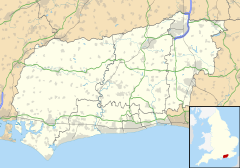Lodsworth
| Lodsworth | |
|---|---|
 St Peter's church |
|
| Lodsworth shown within West Sussex | |
| Area | 12.46 km2 (4.81 sq mi) |
| Population | 672. 2011 Census |
| • Density | 55/km2 (140/sq mi) |
| OS grid reference | SU927232 |
| • London | 42 miles (68 km) NE |
| Civil parish |
|
| District | |
| Shire county | |
| Region | |
| Country | England |
| Sovereign state | United Kingdom |
| Post town | PETWORTH |
| Postcode district | GU28 9 |
| Dialling code | 01798 |
| Police | Sussex |
| Fire | West Sussex |
| Ambulance | South East Coast |
| EU Parliament | South East England |
| UK Parliament | |
| Website | http://www.lodsworth.org.uk/ |
Lodsworth is a small village and civil parish in the Chichester district of West Sussex, England. It is situated between Midhurst and Petworth, half a mile north of the A272 road. It lies within the Sussex Downs Area of Outstanding Natural Beauty, just to the north of the valley of the River Rother, and a tributary stream the River Lod runs close to the east end of the village.
In the 2001 census the parish covered 12.46 km² and had 282 households with a total population of 690. 298 residents were economically active. The population at the 2011 Census (including Selham) was 672. The parish is a long thin strip running north to south, from the slopes of Blackdown in the north to Gallows Hill on the border with Graffham south of the River Rother. It includes the hamlet of Lickfold, with a pub beside the River Lod and a triangular green where the road to the top of Bexley Hill meets the Lodsworth to Haslemere road. South of the village there are more houses, a pub and a small factory at Halfway Bridge on the A272.
It has a small Church of England parish church, Saint Peter's, a pub, the Hollist Arms, and a village hall. After nearly 20 years without a grocery shop, a group of villagers launched in 2007 a community-run shop, the Lodsworth Larder, built with ecological material to provide local products to local people. · ·
Built by the Bishop of London, who owned the manor during the Middle Ages, when first built the Manor House would have been the finest building in Lodsworth. The present house is likely to have been the home of the Bishop's steward, who would have administered the manor. Manorial courts would have been held there and there was a basement dungeon to hold prisoners. The Manor was held as a "Liberty" by the Bishop, making it independent of the county justice system, so even the most serious crimes would have been tried there, and executions would have been carried out at Gallows Hill on the border with Graffham. Archaeological work during the autumn of 2002 revealed the foundations of a 7-metre extension to the east of the building, with 1 metre foundations resting on solid rock which may have supported a tower. It is likely that there was a great hall to the south of the building.
...
Wikipedia

